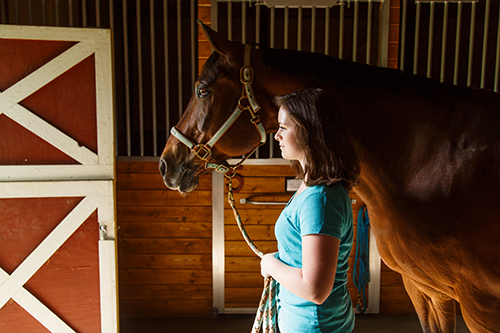Biosecurity for Horses at Home

Participation in horse shows, trail rides or other equine events is frequently a key reason why people own horses and owners generally like to show other people their horses when guests visit their farm, ranch or stable. This also means that that the horses are at risk, even when at home, from potential biosecurity breaches.
Biosecurity simply means life protection.
The following steps may be useful guidelines as you think about biosecurity at home:
- Work with your veterinarian to establish the appropriate vaccination program for horses your home herd and horses that travel. This may vary around the country, but will generally include Equine Influenza, Equine Encephalomyelitis (EEE, WEE, VEE as appropriate), Tetanus and Strangles. Additional vaccinations may be recommended by your veterinarian. Equine Herpes Virus (EHV1 and EHV4) has become a major concern. If you have new horses coming to your barn, you may want to make certain they have been vaccinated as well. Many states or events require a current negative Coggins test (Equine Infections Anemia or EIA) and a current health certificate when horses are shipped. This may be a requirement for horses arriving at your facility.
- If possible, have a visitor parking lot and unloading area that is separate from your barn area. Try to avoid spreading manure that might come off trailers on your pastures.
- Consider having a disinfectant footbath for all visitors to walk thru before they enter your barn. Have waterless hand solution available as well.
- If you have planned guest visitors, graciously suggest that they not wear the same clothes, particularly boots, as they wear in their home barn, particularly if you are aware of any outbreaks in your area. You may want to have disposable plastic boot covers available.
- If possible, have an isolation area where new horses are stabled for 30 days before they are introduced to the herd or have nose to nose contact.
- If you groom or handle horses from other farms or stables, wash your hands thoroughly before you handle your own horses.
- If you travel with horses, consider how your home facility is laid out so that when you return home, you minimize risk to your other horses, particularly young horses and breeding animals.
- Biosecurity can be particularly important if there are reported outbreaks of strangles or Equine Herpes Virus in your area. Be aware of any recent reports as appropriate.
The American Association of Equine Practitioners has useful Biosecurity Guidelines at their web site www.aaep.org. You can also contact your local veterinarian or local extension office for additional information. The United States Department of Agriculture also has a web site which provides very good information at www.aphis.usda.gov/animal-health/equine-health
Being aware of good biosecurity practices can help reduce the risk of introducing diseases to your horses at your facility!
